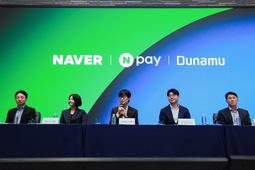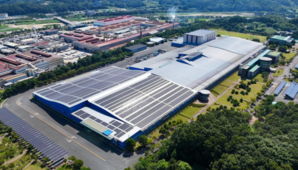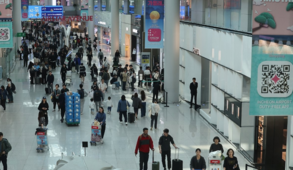
[News Space=Reporter seungwon lee] Whether it's a high-end restaurant, a neighborhood Chinese restaurant, a luxury hotel, or a department store bathroom, there is a corporate logo that catches our eye and is often seen. It is SESCO (CEO Jeon Chan-hyeok), a company specializing in daily life quarantine and hygiene environment.
SESCO's corporate performance is divided into before and after COVID-19. It is evaluated as the company that benefited the most from COVID-19, and its quarantine disinfection and product sales have grown rapidly. As a comprehensive living environment hygiene company, it provides pest control, quarantine disinfection, virus care, food safety, air quality assurance management, and environmental hygiene solutions.
CESCO, the number one quarantine company in Korea, has once again broken its sales record. After the COVID-19 outbreak, its profitability has ‘quantum jumped’ and its retained earnings have also surpassed 300 billion won. In the quarantine market where more than 10,000 companies are competing, CESCO is dominating the domestic market with an overwhelming market share.
According to the SESCO audit report on the Financial Supervisory Service's electronic disclosure system on the 26th, sales in 2023 were 423.6 billion won, up 6.2% from 398.8 billion won the previous year. On the other hand, operating profit was 33.3 billion won, down 11.0% (4.1 billion won) from the previous year (37.4 billion won).
Net income increased to KRW 32.9 billion from KRW 30.1 billion the previous year. Among non-operating income, interest income recorded KRW 8.4 billion, up 211% from KRW 2.7 billion the previous year. Corporate tax also increased significantly, from KRW 8.6 billion in 2022 to KRW 15.8 billion last year, nearly doubling.
Looking at the sales in detail, it was found that the sales of goods were 6 billion won, the sales of services were 40.3 billion won, the sales of products were 1.4 billion won, and the sales of rentals were 12.9 billion won.
In 2022, out of the total sales of 398.9 billion won, service sales recorded 392.5 billion won, accounting for 98.4% of total sales. This means that the money earned by employees going out to the field and doing pest control directly accounts for most of the sales. This proves that the company is practically operated based on human resources.
What is peculiar is that in 2023, service sales recorded KRW 40.3 billion (9.5%) of sales, a decrease of KRW 352.2 billion in one year.
In addition, entertainment expenses increased to 1.4 billion won from 9 billion won the previous year. On the other hand, advertising and publicity expenses decreased by 28% to 8.9 billion won from 12.4 billion won the previous year.
Looking at sales over the past five years, sales have steadily increased from 279 billion won to 363.4 billion won to 384.7 billion won to 398.9 billion won to 423.6 billion won from 2019 to 2023. In particular, since the outbreak of COVID-19 in 2020, sales have exceeded 300 billion won, proving its expertise as a quarantine company and growing rapidly.
Operating profit was KRW 24.6 billion in 2019, KRW 61.1 billion in 2020, KRW 50.5 billion in 2021, KRW 37.4 billion in 2022, and KRW 33.3 billion last year.
Although the qualitative indicator, operating profit, is somewhat stagnant, the quantitative indicator, sales, is growing steadily, and the corporate value is also soaring.
At the end of last year, total assets were 402 billion won, and retained earnings increased from 270 billion won to 303 billion won. Cash assets also increased from 111 billion won to 134 billion won, showing good cash flow. Therefore, debt-free management has been implemented since 2021.
Overseas branches have not yet achieved any significant results. Last year, sales were recorded at 2.1 billion won for SESCO Shanghai, 1.8 billion won for SESCO Beijing, and 4.1 billion won for SESCO Vietnam. In addition, investment companies The Value and Ice Square recorded sales of 480 million won and 645 million won, respectively.
SESCO first entered China in 2003 and established a corporation in Shanghai, but it is regrettable that it has not shown remarkable growth even after 20 years of entering China. The situation is the same in Vietnam. SESCO entered Vietnam in 2014 and has entered its 10th year of business, but its performance is analyzed to be insufficient.
SESCO also owns the SESCO Touch Center building, which is 12 stories above ground and 6 stories below ground, in Sangil-dong, Gangdong-gu, Seoul, and the SESCO Members City building, which is 10 stories above ground and 6 stories below ground. It has 3,345 employees nationwide, and the head office alone has about 400 office workers.
Although the borrowing for the construction of the new building reached 41.4 billion won in 2015, it was fully repaid in 2021. The debt ratio, which was at 83.9%, also decreased to 32.4%.
SESCO was founded on August 23, 1976 as Jeonwoobangje Co., Ltd. by Chairman Jeon Soon-pyo, who was born in Jeongseon, Gangwon-do in 1935, and changed the name to SESCO Co., Ltd. on April 1, 2000. After receiving bachelor’s, master’s, and doctoral degrees in agriculture from Dongguk University, he worked in plant quarantine at the Ministry of Agriculture, Food and Rural Affairs, and later worked at the Agricultural Economics Research Institute. It is analyzed that his experience in the rat-catching work in the 1960s, when grain-eating rats were a serious problem, became the foundation for his business.
Chairman Jeon Soon-pyo stepped down from the management front line in February 2017. Among the founder's two sons and one daughter (Jeon Chan-min, Jeon Chan-hyeok, and Jeon Min-yeong), the second son, Chairman Jeon Chan-hyeok, inherited the family business and is currently managing it. Chairman Jeon Chan-hyeok owns 99.84% of SESCO, which is almost 100%. The remaining 0.08% is each held by the founder and his wife, Kim Gwi-ja. Chairman Jeon is the only registered executive.
Chairman Jeon Soon-pyo has been organizing the succession plan early on, handing over the pesticide company Pharmcl, of which he holds an 80% stake, to his eldest son, Jeon Chan-min, who was pushed out by his younger brother. The remaining 20% of Pharmcl is held by Chairman Jeon Soon-pyo and his wife, Kim Gwi-ja.
PharmCle's predecessor is the pharmaceutical division of SESCO. CEO Jeon Chan-min has been in charge of PharmCle since 2002. PharmCle, which had suffered from chronic deficits, successfully turned a profit in 2014. It is believed that Chairman Jeon Soon-pyo and his wife encouraged Chairman Jeon Chan-hyeok to actively support PharmCle, his brother's company.
According to the Financial Supervisory Service's electronic disclosure, half of Pamcle's sales come from SESCO. SESCO's share of Pamcle's sales over the past five years is 52.9% (KRW 10.167 billion out of KRW 19.235 billion) in 2018, 47.7% (KRW 9.643 billion out of KRW 20.219 billion) in 2019, 39.4% (KRW 10.738 billion out of KRW 27.254 billion) in 2020, 51.8% (KRW 12.722 billion out of KRW 24.553 billion) in 2021, and 50.3% (KRW 13.146 billion out of KRW 26.147 billion) in 2022.
CEO Jeon Chan-min is also a landlord who owns buildings and neighborhood stores. He received a building in Gaepo-dong, Gangnam-gu, Seoul from his mother, Vice Chairman Kim Gwi-ja. The 3.5 billion won worth of accommodations and 1.8 billion won worth of neighborhood stores owned by CEO Jeon are used as collateral for the loan from Farmcl.
In addition to Pamkl, CBT is an affiliate of the owner's family. According to SESCO's audit report, SESCO's purchase of CBT products in 2021 was 5.7 billion won, which is continuously increasing from 4.9 billion won in 2020 and 4.3 billion won in 2019. Established in 2009, CBT is a company that supplies pest control agents to SESCO. It is known that Vice Chairman Kim Gwi-ja of SESCO, wife of Chairman Jeon Soon-pyo, owns 100% of the shares.
It is known that auditor Cho Byeong-chan, who is not only an auditor of SESCO but also an auditor of pest control pharmaceutical company CBT, which is an affiliate of SESCO, is a close friend of Chairman Jeon Chan-hyeok. In addition to auditing SESCO, the two also have a cooperative relationship through SJCO, which is managed by auditor Cho.
Auditor Cho Byeong-chan is a shareholder of Nano Microtech, an OEM manufacturer that produces Cuckoo pressure cookers and water purifiers for Cuckoo Electronics, the number one home appliance manufacturer in Korea. SJCO is currently known as Cuckoo's official distributor.
Koo Bon-hak, CEO of Cuckoo Electronics (eldest son of founder Koo Ja-shin), Jeon Chan-hyeok, Chairman of SESCO, and Jo Byeong-chan, CEO of SJCO, were all born in 1969 and are alumni of the Department of Business Administration at Korea University.
Recently, SESCO has also been enthusiastic about ESG management (environment, society, and governance management). Thanks to these efforts, it was recognized for its ESG management and labor-management cooperation performance and received the Minister of Employment and Labor Award at the 18th National Sustainable ESG Conference held at Lotte Hotel in Sogong-dong, Seoul on May 10.
This award ceremony was held to reward excellent companies that are exemplary in practicing sustainable ESG management, thereby enhancing corporate competitiveness and creating an opportunity to actively respond to the rapidly changing global economy. It was hosted by the Korea Press Association and Korea University ESG Research Institute, and sponsored by nine central government agencies including the Ministry of Strategy and Finance, Ministry of Foreign Affairs, Ministry of Health and Welfare, Ministry of Environment, Ministry of Employment and Labor, Fair Trade Commission, Financial Services Commission, Ministry of Food and Drug Safety, and the Joint Growth Committee.
SESCO was recognized for its efforts including gender-equal personnel policy, high percentage of regular employees and stable employment, guaranteed retirement age and new employment of middle-aged and older workers, organizational culture of mutual respect and systematic internal education programs, establishment of internal communication channels and reinforcement of dedicated departments, working culture based on scenario planning (IPSToMCLS) and team system, and establishment of basic guardian guides for employees’ participation in ESG management.
SESCO is a specialized company that provides customized solutions for customers in the environmental hygiene fields such as pest control, food safety, environmental home appliances, foreign substance analysis, and test analysis. It was the first company in the quarantine and disinfection industry to acquire the five major standard management certifications (ISO9001, 14001, 45001, 27001, 27701) and has strengthened its ESG capabilities by developing eco-friendly pest control systems and agents.
SESCO said, “We have been working to improve employee job satisfaction and fulfill corporate social responsibility, so this award is very meaningful,” adding, “We will continue to listen to internal and external opinions and become a company that creates ESG values.”
























































